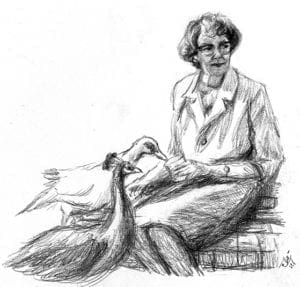Genius and grace: Flannery O’Connor’s Jesuit friend
By LORRAINE V. MURRAY, Commentary | Published August 10, 2020
Most Southerners know who Flannery O’Connor was, although there is sometimes the odd exception. For example, when a friend recently mentioned her name, the response was: “Who was he?”
She was one of the greatest writers of the 20th century, who was awarded the National Book Award posthumously. Born on March 25, 1925 in Savannah, she lived most of her life on Andalusia farm in Milledgeville.
 She was stricken with lupus when she was just 25 and suffered a painful decline until her death on Aug. 3, 1964 at age 39.
She was stricken with lupus when she was just 25 and suffered a painful decline until her death on Aug. 3, 1964 at age 39.
O’Connor fans know she loved peafowl and had an impressive collection of the birds at Andalusia. They also know her stories often rely on a moment of unexpected grace to change the characters’ hearts. She loved her faith and said that if she were not Catholic, she would have “no reason to write, no reason to see, no reason to ever feel horrified or even enjoy anything.”
What many don’t know is that Flannery had a Jesuit priest in her life, who was her spiritual adviser, confessor and close friend. He was James Hart McCown, born in Mobile, Alabama in 1911, who was assistant pastor of St. Joseph’s Church in Macon when they met.
After sending her a letter, he showed up at Andalusia on a winter day in 1956. When he said he liked her stories, she was stunned. She later wrote to a friend, “No priest has ever said turkey-dog to me about liking anything I wrote.”
Writing for “America” magazine 15 years after her death, Father McCown said he had expected to meet a “smart looking, independent acting lady author.”
The young woman he met had sharp blue eyes and a face that was puffy from the medication she took for lupus. She was using aluminum crutches and wearing old jeans and a brown blouse, when she opened the door and said unceremoniously, “Howdy.”
The Jesuit and the writer had much in common. O’Connor was orthodox theologically, seeing the Catholic Church’s teachings as “Christ speaking through time.” Her spiritual director had to be on the same page—and Father McCown was.
Like Flannery, he had been raised in the Deep South with racist attitudes that he later overcame. She tackled the ugly underbelly of racism through her stories and said, after a shocking experience on a bus, where the driver insulted the black passengers: “Right then and there, I became an integrationist.” He was active in the civil rights movement and proud of establishing the first integrated parish in Fort Valley.
During the eight years of their friendship, she praised Father McCown as a good spiritual director and confessor, and believed spiritual direction required genius and grace. He admired her as an “unappreciated prophet in her hometown.”
When another novelist told Father McCown there was no love in Flannery’s writing, he shared this with Flannery, who said the woman was right.
She then confided, “You can’t write about love when you haven’t had it, leastwise the kind she is talking about.” In his article, he noted that her struggles with lupus had been a huge barrier to finding love and getting married.
The spiritual problems she sought his advice on reminded him of matters a schoolgirl might fret over. Her stories, however, showed her awareness of the sinful side of human relationships.
“How such sophistication could coexist with such innocence and delicacy of conscience is still a marvel to me,” he wrote.
After her death, Father McCown wrote to friends, “Well I know how you feel about our precious Flannery and you know how I feel. God has his own reasons for removing from our needful world such choice souls so soon. But it is an exercise in Faith to accept it.”
He said he believed souls in heaven can achieve greater good by their prayers than anything they did on earth.
Then he revealed his grief in losing his beloved blue-eyed friend: “But it’s not easy to adjust my human feeling to it.”
Sketch is by Lorraine’s late husband, Jef. Lorraine is the author of “The Abbess of Andalusia: Flannery O’Connor’s Spiritual Journey.” Her email address is lorrainevmurray@yahoo.com.